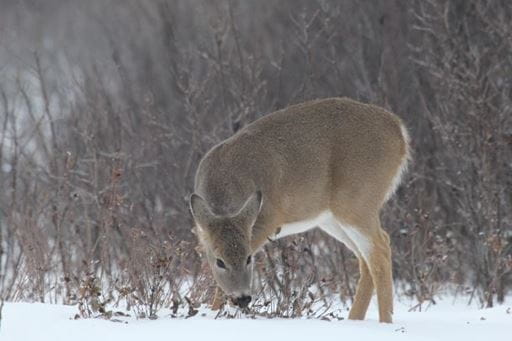Released on March 2, 2021
Saskatchewan's recent stretch of harsh weather has raised a variety of wildlife welfare questions across the province. Many concerned citizens are asking what options are available to help wildlife cope with severe winter conditions.
Most species are resilient and well-adapted to surviving Saskatchewan winters. However, in their efforts to find food and cover from the elements, wildlife will sometimes congregate in yards, communities and feed storage areas, causing damage.
The natural inclination for many people is to put out feed to minimize damage to trees and shrubs, but that isn't a great solution.
"Although winter-related starvation can occur, trying to help wildlife through supplemental feeding, or feeding programs, can end up causing these animals more harm than good," Ministry of Environment Wildlife Biologist Katherine Conkin said. "For example, when deer eat carbohydrate-rich food sources during the winter, such as grain or hay, they can die from a process known as rumen acidosis, or bloat."

Supplemental feeding can also have other negative consequences, such as drawing animals in from long distances and away from good winter cover. It can also increase predation and disease transmission.
"The ministry monitors annual winter conditions and adjusts species management strategies to ensure wildlife populations are sustainably managed over the long term," Conkin said. "Residents interested in helping Saskatchewan's wildlife can participate in various conservation initiatives that preserve wildlife habitat. They can also participate in co-operative wildlife management surveys and remain engaged in wildlife management activities, such as the ministry's annual Hunter Harvest Survey."
Residents concerned about wildlife-related damage are encouraged to visit the Saskatchewan Crop Insurance Corporation's webpage at https://www.scic.ca/wildlife/ to learn more about prevention techniques or for information on available compensation for damaged agricultural commodities.
Under the Wildlife Damage Compensation Program, all Saskatchewan producers are eligible for up to 100 per cent compensation on damage caused by wildlife. You do not have to be an existing Crop Insurance customer to make a claim.
For more information, visit www.saskatchewan.ca/environment.
-30-
For more information, contact:
Corey Rhiendel
Environment
Regina
Phone: 306-787-6595
Email: corey.rhiendel@gov.sk.ca
Cell: 306-519-9078

